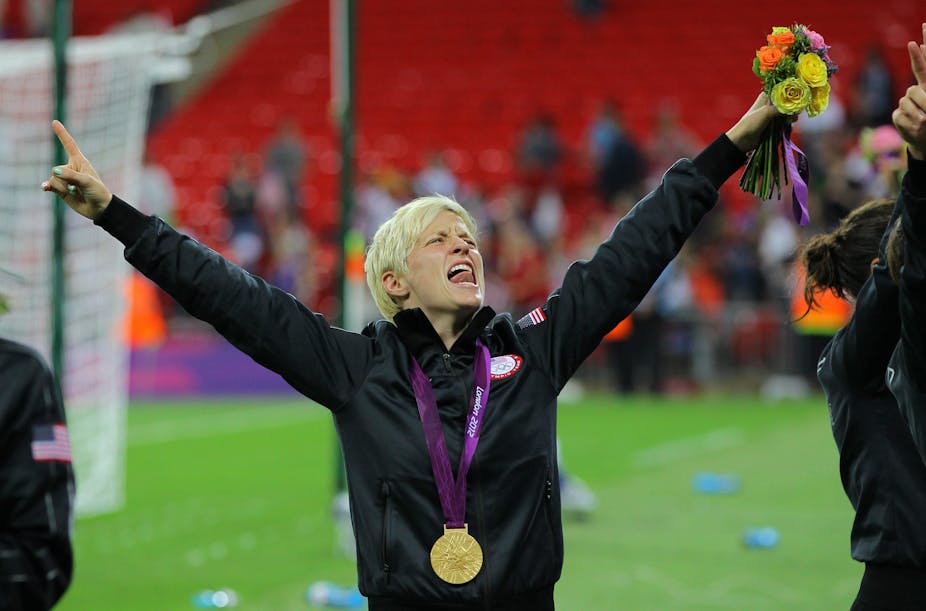The decorated Australian swimmer, Emily Seebohm, climbed out of the pool in tears last week … because she won silver. Through a tear-streaked interview, Seebohm apologised to her parents, her coach, and the Australian public for her performance – a performance that earned her a personal best in the 100m backstroke final.
She should have been shedding tears of joy for this incredible feat, not frustration and regret.
Seebohm is not alone. A number of athletes from around the world have apologised for their “disappointing” performances in these Olympic games. These performances, for many, were personal records. Which raises the question – how have our priorities become so skewed that our athletes are apologising for failing to win gold?
The intense focus on gold and overall medal count is no surprise as it’s an easy measure of success. Likewise, there’s nothing new in using Olympic medal success to justify funding support for elite sport.
In the past four Olympic games, Australian athletes have performed well, ranking among the top seven countries or higher. We claimed 41 medals in Atlanta (1996), 58 in Sydney (2000), 49 in Athens (2004), and 46 in Beijing (2008). The comparatively “dismal” performance in London (with 29 medals thus far) has already sparked debate about the status of elite sport in this country.
So, what does winning gold or having the best medal count really do for sport?
Besides providing a justification for support of elite sport funding, the assumption is gold medals raise the sport’s profile, increases participation in sport and inspires young athletes to follow in their Olympic heroes’ footsteps. But do gold medals really do this?
Recent statistics of sport participation in England have actually shown a decline in sport participation in the years leading up to the London games. Similarly, in the US, there was no mad rush of athletes to the pool in the years following Michael Phelps’ history-making success in the 2008 Olympic Games.
In fact, statistics from the US, Sport England, and Australia indicate that changes in sport participation were not impacted by athlete success in the Olympic Games. In all three cases, sport participation remained the same or declined following the 2008 Olympic Games.
Further, the emphasis on winning challenges the Olympic ideal of “sport for all”. With sayings such as, “winning isn’t everything, it’s the only thing” or “silver is the first place to lose” we are contradicting the idea that sport can be, and should be, for everyone.

By emphasising winning, we force athletes to specialise in specific sports sooner and we place a higher value on competition at an earlier age. Too often, the outcome is earlier burn-out for those pushed too hard too soon and no viable pathways to continue for athletes that are unable to make the cut as competition becomes more elite. In this way, an emphasis on winning can actually counteract our efforts to improve participation in sport.
What does winning gold or having the best medal count really do for the athlete?
In the ancient Olympic games, athletes were celebrated for their attempts to achieve Arête, or sporting excellence, through the mutual quest for excellence among competitors. While the winner was celebrated and heralded a hero, there were no records, no statistics, and certainly no medal counts. All athletes were celebrated for their quest for triumph in honour of Zeus.
While modern sport is secular and record-driven, a main ideal of Olympism (derived from the ancient Games) is to value sporting excellence. However, as evidenced by the continuous scrutiny of our athletes’ performance by the national and international media, we clearly value winning (gold) more.
Certainly, winning gold is what all athletes dream of achieving, but it’s not the only determinant of success. Is achieving a personal record against the greatest athletes in the world not sporting excellence?
These athletes are not machines. They are people who have dedicated their entire lives to reaching a pinnacle of sporting achievement – competing in the Olympic Games. We, the media and public, should remember winning is not the only measure of success or excellence. Outcomes such as more athletes in qualifying rounds, new personal records, and better overall final finishes from previous competitions should be considered – and celebrated.
As the Olympic Games conclude and we welcome our athletes home, perhaps we should remember that only a very few people in the world can achieve what they have. Perhaps we should celebrate their quest for excellence rather than scratch our heads and wonder what went wrong.

